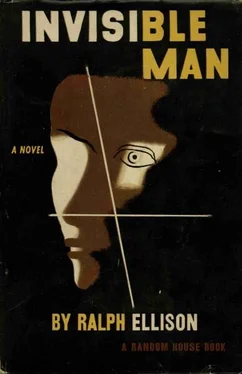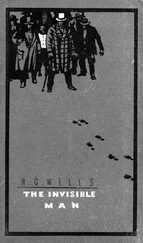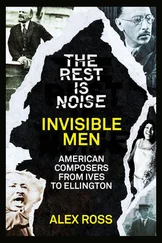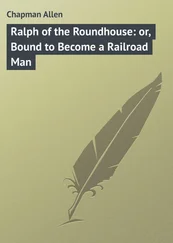Ralph Ellison - Invisible man
Здесь есть возможность читать онлайн «Ralph Ellison - Invisible man» весь текст электронной книги совершенно бесплатно (целиком полную версию без сокращений). В некоторых случаях можно слушать аудио, скачать через торрент в формате fb2 и присутствует краткое содержание. Год выпуска: 1995, ISBN: 1995, Издательство: Vintage Books, Жанр: Классическая проза, на английском языке. Описание произведения, (предисловие) а так же отзывы посетителей доступны на портале библиотеки ЛибКат.
- Название:Invisible man
- Автор:
- Издательство:Vintage Books
- Жанр:
- Год:1995
- ISBN:9780679732761
- Рейтинг книги:4 / 5. Голосов: 1
-
Избранное:Добавить в избранное
- Отзывы:
-
Ваша оценка:
- 80
- 1
- 2
- 3
- 4
- 5
Invisible man: краткое содержание, описание и аннотация
Предлагаем к чтению аннотацию, описание, краткое содержание или предисловие (зависит от того, что написал сам автор книги «Invisible man»). Если вы не нашли необходимую информацию о книге — напишите в комментариях, мы постараемся отыскать её.
The Waste Land,
Invisible man — читать онлайн бесплатно полную книгу (весь текст) целиком
Ниже представлен текст книги, разбитый по страницам. Система сохранения места последней прочитанной страницы, позволяет с удобством читать онлайн бесплатно книгу «Invisible man», без необходимости каждый раз заново искать на чём Вы остановились. Поставьте закладку, и сможете в любой момент перейти на страницу, на которой закончили чтение.
Интервал:
Закладка:
I looked at him and shook my head as he watched me inscrutably. Finding no words to ask him more about it, I slipped the link over my knuckles and struck it sharply against the desk.
Brother Tarp chuckled. "Now there's a way I never thought of using it," he said. "It's pretty good. It's pretty good."
"But why do you give it to me, Brother Tarp?"
"Because I have to, I guess. Now don't go trying to get me to say what I can't. You're the talker, not me," he said, getting up and limping toward the door. "It was lucky to me and I think it might be lucky to you. You just keep it with you and look at it once in a while. Course, if you get tired of it, why, give it back."
"Oh, no," I called after him, "I want it and I think I understand. Thanks for giving it to me."
I looked at the dark band of metal against my fist and dropped it upon the anonymous letter. I neither wanted it nor knew what to do with it; although there was no question of keeping it if for no other reason than that I felt that Brother Tarp's gesture in offering it was of some deeply felt significance which I was compelled to respect. Something, perhaps, like a man passing on to his son his own father's watch, which the son accepted not because he wanted the old-fashioned time-piece for itself, but because of the overtones of unstated seriousness and solemnity of the paternal gesture which at once joined him with his ancestors, marked a high point of his present, and promised a concreteness to his nebulous and chaotic future. And now I remembered that if I had returned home instead of coming north my father would have given me my grandfather's old-fashioned Hamilton, with its long, burr-headed winding stem. Well, so my brother would get it and I'd never wanted it anyway. What were they doing now, I brooded, suddenly sick for home.
I could feel the air from the window hot against my neck now as through the smell of morning coffee I heard a throaty voice singing with a mixture of laughter and solemnity:
Don't come early in the morning
Neither in the heat of the day
But come in the sweet cool of the
Evening and wash my sins away ...
A whole series of memories started to well up, but I threw them off. There was no time for memory, for all its images were of times passed.
There had been only a few minutes from the time that I'd called in Brother Tarp about the letter and his leaving, but it seemed as though I'd plunged down a well of years. I looked calmly now at the writing which, for a moment, had shaken my total structure of certainty, and was glad that Brother Tarp had been there to be called rather than Clifton or some of the others before whom I would have been ashamed of my panic. Instead he'd left me soberly confident. Perhaps from the shock of seeming to see my grandfather looking through Tarp's eyes, perhaps through the calmness of his voice alone, or perhaps through his story and his link of chain, he had restored my perspective.
He's right, I thought; whoever sent the message is trying to confuse me; some enemy is trying to halt our progress by destroying my faith through touching upon my old southern distrust, our fear of white betrayal. It was as though he had learned of my experience with Bledsoe's letters and was trying to use that knowledge to destroy not only me but the whole Brotherhood. Yet that was impossible; no one knew that story who knew me now. It was simply an obscene coincidence. If only I could get my hands upon his stupid throat. Here in the Brotherhood was the one place in the country where we were free and given the greatest encouragement to use our abilities, and he was trying to destroy it! No, it wasn't me he was worrying about becoming too big, it was the Brotherhood. And becoming big was exactly what the Brotherhood wanted. Hadn't I just received orders to submit ideas for organizing more people? And "a white man's world" was just what the Brotherhood was against. We were dedicated to building a world of Brotherhood.
But who had sent it -- Ras the Exhorter? No, it wasn't like him. He was more direct and absolutely against any collaboration between blacks and whites. It was someone else, someone more insidious than Ras. But who, I wondered, forcing it below my consciousness as I turned to the tasks at hand.
The morning began with people asking my advice on how to secure relief; members coming in for instructions for small committee meetings being held in corners of the large hall; and I had just dismissed a woman seeking to free her husband, who had been jailed for beating her, when Brother Wrestrum entered the room. I returned his greeting and watched him ease into a chair, his eyes sweeping over my desk-with uneasiness. He seemed to possess some kind of authority in the Brotherhood, but his exact function was unclear. He was, I felt, something of a meddler.
And hardly had he settled himself when he stared at my desk, saying, "What you got there, Brother?" and pointed toward a pile of my papers.
I leaned slowly back in my chair, looking him in the eye. "That's my work," I said coldly, determined to stop any interference from the start.
"But I mean that," he said, pointing, his eyes beginning to blaze, "that there."
"It's work," I said, "all my work."
"Is that too?" he said, pointing to Brother Tarp's leg link.
"That's just a personal present, Brother," I said. "What could I do for you?"
"That ain't what I asked you, Brother. What is it?"
I picked up the link and held it toward him, the metal oily and strangely skinlike now with the slanting sun entering the window. "Would you care to examine it, Brother? One of our members wore it nineteen years on the chain gang."
"Hell, no!" He recoiled. "I mean, no, thank you. In fact, Brother, I don't think we ought to have such things around!"
"You think so," I said. "And just why?"
"Because I don't think we ought to dramatize our differences."
"I'm not dramatizing anything, it's my personal property that happens to be lying on my desk."
"But people can see it!"
"That's true," I said. "But I think it's a good reminder of what our movement is fighting against."
"No, suh!" he said, shaking his head, "no, suh! That's the worse kind of thing for Brotherhood -- because we want to make folks think of the things we have in common. That's what makes for Brotherhood. We have to change this way we have of always talking about how different we are. In the Brotherhood we are all brothers."
I was amused. He was obviously disturbed by something deeper than a need to forget differences. Fear was in his eyes. "I never thought of it in just that way, Brother," I said, dangling the iron between my finger and thumb.
"But you want to think about it," he said. "We have to discipline ourselves. Things that don't make for Brotherhood have to be rooted out. We have enemies, you know. I watch everything I do and say so as to be sure that I don't upset the Brotherhood -- 'cause this is a wonderful movement, Brother, and we have to keep it that way. We have to watch ourselves, Brother. You know what I mean? Too often we're liable to forget that this is something that's a privilege to belong to. We're liable to say things that don't do nothing but make for more misunderstanding."
What's driving him, I thought, what's all this to do with me? Could he have sent me the note? Dropping the iron I fished the anonymous note from beneath the pile and held it by a corner, so that the slanting sun shone through the page and outlined the scrawling letters. I watched him intently. He was leaning upon the desk now, looking at the page but with no recognition in his eyes. I dropped the page upon the chain, more disappointed than relieved.
"Between you and me, Brother," he said, "there are those amongst us who don't really believe in Brotherhood."
Читать дальшеИнтервал:
Закладка:
Похожие книги на «Invisible man»
Представляем Вашему вниманию похожие книги на «Invisible man» списком для выбора. Мы отобрали схожую по названию и смыслу литературу в надежде предоставить читателям больше вариантов отыскать новые, интересные, ещё непрочитанные произведения.
Обсуждение, отзывы о книге «Invisible man» и просто собственные мнения читателей. Оставьте ваши комментарии, напишите, что Вы думаете о произведении, его смысле или главных героях. Укажите что конкретно понравилось, а что нет, и почему Вы так считаете.











